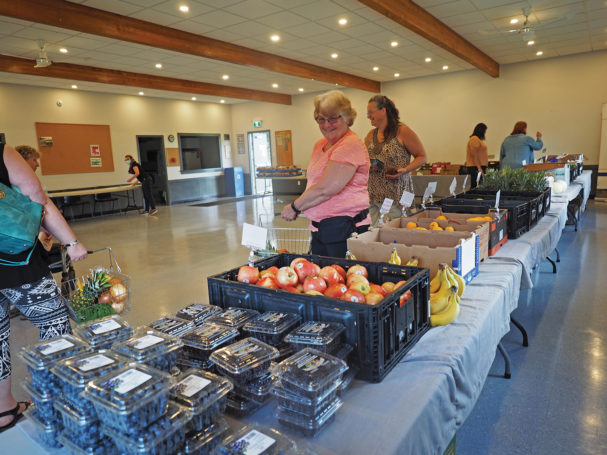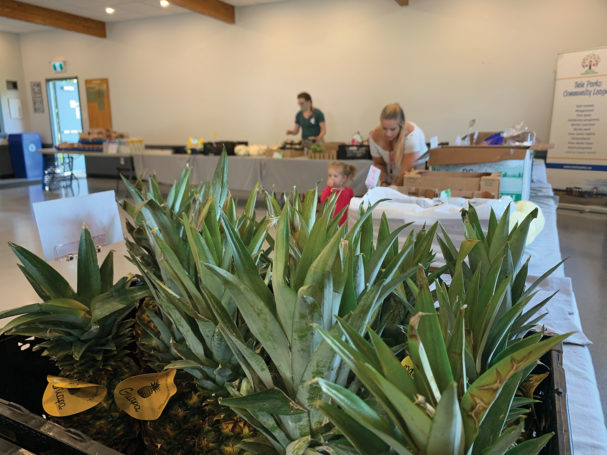October 2, 2020
Fresh Routes removes socio-economic barriers to nutritious food
It’s early evening on a Thursday in mid-summer and perfect T-shirt weather — not too hot and not too cold. Wispy clouds drift across a sky of brilliant blue; behind them, the sun is still high above the horizon. There is a slight movement in the air that could charitably be called a breeze. As a constant stream of traffic hums along 118th Avenue, cyclists and pedestrians pass local businesses and buildings adorned with colourful street art. This is a neighbourhood embracing summer while still finding its way through the social and economic shocks of the COVID-19 pandemic.
In the parking lot of the Alberta Avenue Community Centre stands one such sign of reawakening. A delivery truck is parked beside tables covered with boxes full of fresh produce, bread and eggs, manned by volunteers. A sign on the truck proclaims that the Fresh Routes mobile grocery store is back, enticing a steady stream of customers to scout its offerings.

Fresh Routes, a not-for-profit social enterprise, began in Calgary in 2018 as a pilot project of the Leftovers Foundation. Since 2019, the organization also operates in Edmonton, with more expansion on the horizon. The goal of Fresh Routes is to bring fresh, nutritious and affordable food — sourced in Edmonton, primarily from H&W Produce — into communities where low incomes, residents’ limited mobility or lack of transportation options can create barriers to shopping. The feeling is something like a neighbourhood farmers’ market, and that is no accident.
Fresh Routes’ co-founder and CEO Lourdes Juan believes the organization can play a vital role in community-building.
“By focusing on food access, one of the pillars of food security, we aim to work as part of a larger system towards realizing a vision of building sustainable, equitable and inclusive systems that enable all Canadians to live healthy lives,” Juan said in an email interview.
While the mobile grocery store might be the most visible, it is only one of several Fresh Routes programs. During the COVID-19 pandemic, the mobile grocery store program was suspended from March until early June. In its place, an emergency delivery service and a door-to-door delivery service for seniors and high-risk customers continued to supply groceries while keeping vulnerable people safe. In addition, the ongoing Fresh Baskets program remains available to Indigenous communities and low-income housing complexes that are isolated from grocery supply chains.

What all the Fresh Routes programs have in common is a commitment to fill gaps in nutritious food access, regardless of customers’ resources.
“One of our primary values as an organization is ensuring dignified food access,” said Morgan Allen, Fresh Routes Edmonton City Lead. “Part of that is allowing people choice and not creating barriers through excessive disclosure about someone’s circumstances, which can make it feel anxiety-provoking.”
In addition, Allen said, all community members regardless, of income, are encouraged to shop at the mobile grocery stores. As a non-profit social enterprise, Fresh Routes seeks to generate revenue that can then be put back into its operations, allowing expansion into other areas. It also helps with the community-building that drives the Fresh Routes idea.
“It’s really important to us that we’re creating spaces where folks don’t feel a sense of stigma,” Allen said. “We’re all going to come together and enjoy this vibrant social base, hopefully get to know our neighbours and build some community there as well.”
The community-centric approach has led to a number of valuable partnerships with other organizations. Craig Stumpf-Allen, director of grants and community engagement for Edmonton Community Foundation (ECF), said ECF’s support was a direct result of that aspect of the business model.
“Our committee really appreciated that this project simultaneously addresses multiple issues: food deserts and access to nutritious, affordable food, social connection, waste reduction and local food production through their partnerships with farmers,” Stumpf-Allen said.
Back at the Alberta Avenue location, the customers circle the table, checking out green peppers, strawberries, apples, jalapēnos, cucumbers and onions. A few metres away, a white-haired man in a baseball cap sits in a lawn chair, holding court and engaging three or four passersby in conversation. Laughter rings out at his repartee. If Fresh Routes’ goal was to bring healthy food to underserved communities, it’s definitely created that farmers’ market feel: part shopping excursion and part community block party.